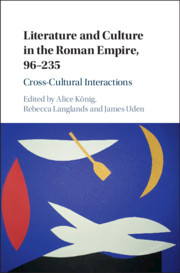Book contents
- Literature and Culture in the Roman Empire, 96–235
- Literature and Culture in the Roman Empire, 96–235
- Copyright page
- Contents
- Figures
- Contributors
- Preface
- Timeline
- Abbreviations
- Map
- Introduction
- Part I Refiguring Roman and Greek Interactions
- Chapter 1 Beyond Romans and Others
- Chapter 2 The Noise-Lovers
- Chapter 3 Plutarch and Roman Exemplary Ethics
- Chapter 4 Patronage, Cultural Difference and Literary Interactivity
- Chapter 5 The Romance of Republican History
- Chapter 6 Tactical Interactions
- Part II Imperial Infrastructure: Documents and Monuments
- Part III Cultural Translation and Transformation
- References
- Index
Chapter 6 - Tactical Interactions
Dialogues between Greece and Rome in the Military Manuals of Aelian and Arrian
from Part I - Refiguring Roman and Greek Interactions
Published online by Cambridge University Press: 28 April 2020
- Literature and Culture in the Roman Empire, 96–235
- Literature and Culture in the Roman Empire, 96–235
- Copyright page
- Contents
- Figures
- Contributors
- Preface
- Timeline
- Abbreviations
- Map
- Introduction
- Part I Refiguring Roman and Greek Interactions
- Chapter 1 Beyond Romans and Others
- Chapter 2 The Noise-Lovers
- Chapter 3 Plutarch and Roman Exemplary Ethics
- Chapter 4 Patronage, Cultural Difference and Literary Interactivity
- Chapter 5 The Romance of Republican History
- Chapter 6 Tactical Interactions
- Part II Imperial Infrastructure: Documents and Monuments
- Part III Cultural Translation and Transformation
- References
- Index
Summary
This chapter looks at two interconnected texts which were published within two or three decades of each other: Aelianus Tacticus’ Tactical Theory (addressed to Trajan) and Arrian’s Tactics, published two or three decades later under Hadrian. Both texts appear to draw on the same source material, and it is reasonable to suppose that Arrian was aware of Aelian’s earlier treatise, although there is no direct interaction between them. Their different approaches to the same material offer an opportunity to explore different models of literary and cross-cultural interaction, and also to examine our go-to metaphors and interpretative models for analysing them. While Aelian establishes a series of polemical comparisons between age-old Greek military theory and currently effective Roman military practice, Arrian hints at overlaps between Greek and Roman traditions, both by incorporating a section on Roman cavalry manoeuvres and by interacting with a speech delivered by Hadrian to the Roman army at Lambaesis in 128. Both approaches are equally tactical; and both are revealing of the complex dynamics of cross-cultural interaction, which took place on and off the page, and in literary and less literary forms of writing.
Keywords
- Type
- Chapter
- Information
- Literature and Culture in the Roman Empire, 96–235Cross-Cultural Interactions, pp. 134 - 156Publisher: Cambridge University PressPrint publication year: 2020
- 3
- Cited by



